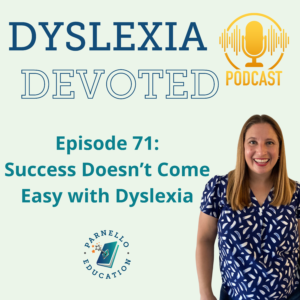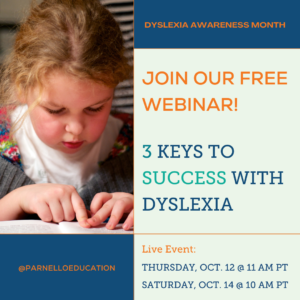

In This Episode:
Did you know October is Dyslexia Awareness Month? Let the dyslexia awareness month activities continue!
Welcome to Episode 71 of Dyslexia Devoted and today we’re talking about the challenges to fight for success with dyslexia.
Show notes: parnelloeducation.com/episode71
This Episode's Topics:
- Free Masterclass: 3 Keys to Success with Dyslexia
- The good, the bad, and the ugly!
Resources Mentioned in this Episode:
- Get the Dyslexia Devoted Newsletter
- Book a Parent or Educator Coaching Session
- 3 Keys to Success with Dyslexia Masterclass
- Parnello Education Courses
Connect with Lisa Parnello:
0:03
Hello and welcome to dyslexia devoted the podcast dedicated to building awareness, understanding and strategies to help those with dyslexia. I'm your host Lisa Parnello, dyslexia therapist and founder of Parnello education services. Join me as we dive into today's episode of dyslexia devoted. Hello friends, and welcome to the second week of dyslexia Awareness Month. I'm so excited to have you joining me today. This week's episode was inspired by a couple of my clients and those kiddos had a tough week. This week's episode number 71 of dyslexia devoted is called Success doesn't come easy with dyslexia, or any learning difference for that matter. Now before we jump into this week's episode, I wanted to let you know that registration is officially open for my upcoming masterclass this week. So if you go to Parnello education.com forward slash masterclass, then you can sign up for my live class the three keys to success with dyslexia. Now, if you've gone to that website before and registered to see the pre recorded version, that link has officially changed to a registration page. So even if you've seen the recorded version of my class before, you're welcome to take it live so that you can join the q&a session at the end of our webinar. Now remember, those of you on the dyslexia devoted newsletter get access to all of these things before everybody else. So we actually already have 20 people registered for the masterclass. And I can't wait to see a few more of you there. I gave two choices, you can sign up for either a Thursday morning or a Saturday morning. And this is all West Coast time. So maybe that means afternoon or evening for you if you are on the East Coast, or I am so excited I have people joining from around the world. We have three different countries of people participating outside of the United States. So it is always so exciting to me to see how far and wide this podcast has reached because when I started it, I thought nobody was going to listen to it. So to be able to see that I am now being able to help parents and educators from around the world just brings me so much joy. So I really hope a few more of you guys. Join us and register to attend this week's live masterclasses and I can't wait to see you. Actually, that's a lie. I won't see you, you will see me. I will be on the video screen and you can be in the chat, commenting and asking your questions. But everybody's off camera, you can be in your pajamas, I don't care. All right, jumping into Episode 71. Success does not come easy. So this week's episode is going to be the good, the bad and the ugly. Because, you know, this journey is not an easy one. I cannot promise you that everything's gonna be perfect. Or that even once you get all the right things in place, everything's gonna go great. It's gonna fall apart sometimes. And I feel like this podcast needs to be as realistic as possible. I am not one for sugarcoating. It has gotten me into trouble over the years in my career, because I don't believe in lying and fibbing to parents and making things seem like they're great when they're not. So this week is are good, bad and ugly. Let me preface this by saying that all of these stories are bad situations. So when I say the good, bad, and the ugly, I mean, the responses to the situations and how things are going. When we talk about kids with dyslexia and learning differences being successful, we think that that means they're all going to be okay, everything's just gonna be fine. Well, reality is you can make it so far and still hit a lot of pitfalls along the way. So the first kiddo, I'm thinking about bombed a test. And do you know what happened when we looked at his grades, and we realized this kiddo failed to test nothing, he was okay. He looked at it. And he says, Okay, let's practice working on these parts of the test that I didn't get right. And helped me figure out what I did and how I can get better at it. And we worked on it the entire session, he had no free gets. Now, this may not seem like a big deal. But it's a huge deal. When you have a kid who gets used to failing a lot. Usually, that means really big reactions because they failed yet again, this kiddo, one of our biggest goals has been to be okay with there being some failures along the way. Did you try your best? Did you have a good attitude? And did you pick yourself up when you fell down? That is really our goal. Every time I see him, and each time over the last couple years, it's gotten better. You know, things aren't easy. And no matter how hard kids try, sometimes they're impulsive and make mistakes even though they really didn't know the answer. They just impulsively didn't think it through. Before they moved on to the next problem. This kiddo was able to take it in stride and say, Alright, let's practice. This helped me these are the kinds of problems I got wrong. Can we do a few of those kinds of problems today? And then I'll try again on my makeup test next week. And that is a really good thing for kids to know. It's okay to fail. Learn from your mistakes, pick yourself back up and do better next time. And now for the bad. I had a kiddo in a similar situation fail a test right after the day before the kid going, I feel really good about that this year, I think I'm doing so much better than I was doing last year. And then they took a test. And their entire grade is based on tests. None of their grade is based on all the homework and hard work they put in. It's only based on tests, that kiddo completely fell apart. I knew ahead of time that this was going to happen. Anytime I get an email from both the parent and the teacher that says, Hello tutor. So and So failed their test this week. And we're really concerned, that never goes over well. And so, as that child and I started our session, they promptly burst into tears, and cried and cried and cried about how it's just not fair, and cried and cried and cried some more. And then I realized, I've seen this kid cry before when things are tough. This is a safe space, they can cry all they want, if they if that's what it takes for them to feel better to get it all out. And then we pick ourselves up, and we move forward. But this reaction was bigger than I've seen before. And that's when I knew, Hey, friend, can you tell me what's really bugging you? This seems like a much bigger reaction than I would have expected. You know what it was, no college is ever going to want somebody who's not good at anything. It broke my heart. I'm honestly getting little tears in my eyes, just thinking about that moment. These kids work their tails off, they know that there are consequences to them trying their best and it not being good enough. Sometimes, it was so hard to see this kiddo, this week crumbling over the idea that maybe things aren't going to be okay. There will be we'll get there. Don't worry, we're doing a pick it up session later today. And in fact, in like, a couple of minutes, we realize that kids know that they are trying their best. And that sometimes they do still fail even when they do try their best. And that having learning differences really hard. They have to put in twice as much work as everybody else. And that sucks. But I have to keep reminding myself, how many of my clients, I've talked to their parents. When I talk to their parents, they say, You know what, I think I have dyslexia, I didn't know this growing up. I just was really bad at school. Now that I see my kids struggling. I think that was me. I think I have dyslexia too. And you know, the job titles of some of these clients of mine, whose kids I work with, CEO, inventor, venture capitalist, they have all of these amazing jobs. They're founders of companies, they've done a really great things. But the thing is, they had to fail a lot along the way. And that's how they became amazing people who do amazing things, these kiddos came from parents who had to work their tails off because it was hard for them to and no one knew how to help a kid with dyslexia back then. Or some knew and didn't teach anybody else how to do it yet, we had to remind ourselves that sometimes the strongest people come from the hardest backgrounds, we had to remind ourselves that sometimes it's because they failed so many times that that's why they became so successful. Because they're okay with failing. They've gotten some grit and determination, because they failed so many times that they know, you know, one, failure does not mean everything. And you can pick yourself up, you can try again. And you can be pretty amazing. Now, you might be wondering what kind of test this kid failed. It was a math test. Do you know why they failed? Because they have dyslexia, the student was so overwhelmed when they got the test and saw that it was a bunch of words, they thought they were being tested on the math skills. When half the test was vocabulary and definitions, the student thought they were being tested on their ability to calculate The math equations. So the second they saw the test, they freaked out when they saw all the words on the page. And it caused so much stress that then caused other problems in the calculations, because even with extended time, that also that was the other part of the problem, the student was supposed to get double time to be able to complete their task. But then the teachers forgot the schedule, and the student did not in fact, get double time, they only got about time and a half. That when you have a math test that has a whole bunch of reading and writing and vocabulary knowledge on it really would have taken this child double the time to get it done. Because as soon as you throw in reading and vocabulary into a math test,
9:24
that causes a lot of stress for a kid with dyslexia. Alright, and now for my ugly story of the day. This one came from my coaching program. I was doing a coaching session with a parent that I'll be perfectly honest, I had a hard time controlling my face. Alright, I'll be honest, I totally failed at controlling my face. The parent sent me the kids paperwork right before our session. And as I'm going through and I'm reading it, my jaw dropped, because I was appalled. This child's school failed them so badly. So so so badly and it helped me realize why I was being called in to coach them, and what questions to ask when they have to bring in a lawyer and fight. Because this parent has to fight hard, because boy did this school screw up, I looked at the paperwork. And I've never seen such an appalling discrepancy between a child's intelligence and their academic performance. There were words on there that I don't know if I've ever seen on our reports, or maybe I have, but usually only with a child with a cognitive impairment, meaning theory really, really struggled mentally, to be able to process information and usually have a lower IQ. I can't even tell you the number of times I saw the word impaired on their score report, when normally you'll often see like, above average, below average low, full blown impaired is not a common academic performance score ever, let alone one for a kid with above average intelligence, the school completely and utterly failed this child. They can't read, and their parents are fighting now, the thing I hear over and over and over again, is I just listened to the school of it'll get better just wait, he'll catch on. It wasn't until years later that the parents realized that the school was not fulfilling their promises that the student wasn't getting better, and they weren't catching on. And they did not provide the services they should provide. In order to help a child be successful with a reading problem. I feel like all three of these things today, The Good, the Bad, and The Ugly, make me realize over and over again, why I do what I do to help kids learn how to pick themselves up to help be a safe space when a kid completely falls apart. Because it is hard, even when they do everything they can and to help a parent fight the battle to get the kid exactly what they deserve. The Good, the Bad, and The Ugly, are part of what it takes to be successful. It's not always pretty, it's not always easy. But we can do it, especially when we team up together. So with that said, I'm very excited to be seeing a bunch of you guys live in my master class, the three keys to success with dyslexia because it's not easy, but you can have success. And I really hope you'll join me this week. And I'll have a live q&a session. So even if you've watched the recorded version of my masterclass before, feel free to join us live and register for the live event so that you could ask any questions that you've been dying to ask me. And I can't wait to see you soon. That's all for today. I'll see you next time.
12:36
Thanks for tuning in to today's episode. If you want to learn even more about dyslexia, check out Parnello education.com forward slash courses. See you next time.
